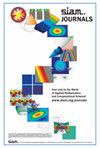通过松弛近端点朗文采样加速贝叶斯成像
IF 2.3
3区 数学
Q3 COMPUTER SCIENCE, ARTIFICIAL INTELLIGENCE
引用次数: 0
摘要
SIAM 影像科学杂志》第 17 卷第 2 期第 1078-1117 页,2024 年 6 月。 摘要:本文提出了一种新的加速近端马尔科夫链蒙特卡洛方法,用于在具有底层凸几何的成像逆问题中执行贝叶斯推理。所提出的策略采用随机松弛近似点迭代的形式,允许两种互补的解释。对于通过莫罗-尤西达平滑法平滑或正则化的模型,该算法等同于以感兴趣的后验分布为目标的过阻尼 Langevin 扩散的隐式中点离散化。对于高斯目标,这种离散化是渐近无偏的,而且对于任何[math]强对数凹(即、与 Pereyra、Vargas Mieles 和 Zygalakis [SIAM J. Imaging Sci.对于非光滑模型,该算法等同于以感兴趣的后验分布的莫罗-约西达近似为目标的 Langevin 扩散的 Leimkuhler-Matthews 离散化,因此比基于 Euler-Maruyama 离散化的传统未调整 Langevin 策略的偏差低得多。对于[数学]强对数凹的目标,所提供的非渐近收敛分析还能确定最佳时间步长,从而最大限度地提高收敛速度。本文提出的方法通过一系列与高斯和泊松噪声的图像解卷积相关的实验进行了演示,实验中使用了假设驱动和数据驱动的凸先验。本文数值实验的源代码可从 https://github.com/MI2G/accelerated-langevin-imla 获取。本文章由计算机程序翻译,如有差异,请以英文原文为准。
Accelerated Bayesian Imaging by Relaxed Proximal-Point Langevin Sampling
SIAM Journal on Imaging Sciences, Volume 17, Issue 2, Page 1078-1117, June 2024.
Abstract.This paper presents a new accelerated proximal Markov chain Monte Carlo methodology to perform Bayesian inference in imaging inverse problems with an underlying convex geometry. The proposed strategy takes the form of a stochastic relaxed proximal-point iteration that admits two complementary interpretations. For models that are smooth or regularized by Moreau–Yosida smoothing, the algorithm is equivalent to an implicit midpoint discretization of an overdamped Langevin diffusion targeting the posterior distribution of interest. This discretization is asymptotically unbiased for Gaussian targets and shown to converge in an accelerated manner for any target that is [math]-strongly log-concave (i.e., requiring in the order of [math] iterations to converge, similar to accelerated optimization schemes), comparing favorably to Pereyra, Vargas Mieles, and Zygalakis [SIAM J. Imaging Sci., 13 (2020), pp. 905–935], which is only provably accelerated for Gaussian targets and has bias. For models that are not smooth, the algorithm is equivalent to a Leimkuhler–Matthews discretization of a Langevin diffusion targeting a Moreau–Yosida approximation of the posterior distribution of interest and hence achieves a significantly lower bias than conventional unadjusted Langevin strategies based on the Euler–Maruyama discretization. For targets that are [math]-strongly log-concave, the provided nonasymptotic convergence analysis also identifies the optimal time step, which maximizes the convergence speed. The proposed methodology is demonstrated through a range of experiments related to image deconvolution with Gaussian and Poisson noise with assumption-driven and data-driven convex priors. Source codes for the numerical experiments of this paper are available from https://github.com/MI2G/accelerated-langevin-imla.
Abstract.This paper presents a new accelerated proximal Markov chain Monte Carlo methodology to perform Bayesian inference in imaging inverse problems with an underlying convex geometry. The proposed strategy takes the form of a stochastic relaxed proximal-point iteration that admits two complementary interpretations. For models that are smooth or regularized by Moreau–Yosida smoothing, the algorithm is equivalent to an implicit midpoint discretization of an overdamped Langevin diffusion targeting the posterior distribution of interest. This discretization is asymptotically unbiased for Gaussian targets and shown to converge in an accelerated manner for any target that is [math]-strongly log-concave (i.e., requiring in the order of [math] iterations to converge, similar to accelerated optimization schemes), comparing favorably to Pereyra, Vargas Mieles, and Zygalakis [SIAM J. Imaging Sci., 13 (2020), pp. 905–935], which is only provably accelerated for Gaussian targets and has bias. For models that are not smooth, the algorithm is equivalent to a Leimkuhler–Matthews discretization of a Langevin diffusion targeting a Moreau–Yosida approximation of the posterior distribution of interest and hence achieves a significantly lower bias than conventional unadjusted Langevin strategies based on the Euler–Maruyama discretization. For targets that are [math]-strongly log-concave, the provided nonasymptotic convergence analysis also identifies the optimal time step, which maximizes the convergence speed. The proposed methodology is demonstrated through a range of experiments related to image deconvolution with Gaussian and Poisson noise with assumption-driven and data-driven convex priors. Source codes for the numerical experiments of this paper are available from https://github.com/MI2G/accelerated-langevin-imla.
求助全文
通过发布文献求助,成功后即可免费获取论文全文。
去求助
来源期刊

SIAM Journal on Imaging Sciences
COMPUTER SCIENCE, ARTIFICIAL INTELLIGENCE-COMPUTER SCIENCE, SOFTWARE ENGINEERING
CiteScore
3.80
自引率
4.80%
发文量
58
审稿时长
>12 weeks
期刊介绍:
SIAM Journal on Imaging Sciences (SIIMS) covers all areas of imaging sciences, broadly interpreted. It includes image formation, image processing, image analysis, image interpretation and understanding, imaging-related machine learning, and inverse problems in imaging; leading to applications to diverse areas in science, medicine, engineering, and other fields. The journal’s scope is meant to be broad enough to include areas now organized under the terms image processing, image analysis, computer graphics, computer vision, visual machine learning, and visualization. Formal approaches, at the level of mathematics and/or computations, as well as state-of-the-art practical results, are expected from manuscripts published in SIIMS. SIIMS is mathematically and computationally based, and offers a unique forum to highlight the commonality of methodology, models, and algorithms among diverse application areas of imaging sciences. SIIMS provides a broad authoritative source for fundamental results in imaging sciences, with a unique combination of mathematics and applications.
SIIMS covers a broad range of areas, including but not limited to image formation, image processing, image analysis, computer graphics, computer vision, visualization, image understanding, pattern analysis, machine intelligence, remote sensing, geoscience, signal processing, medical and biomedical imaging, and seismic imaging. The fundamental mathematical theories addressing imaging problems covered by SIIMS include, but are not limited to, harmonic analysis, partial differential equations, differential geometry, numerical analysis, information theory, learning, optimization, statistics, and probability. Research papers that innovate both in the fundamentals and in the applications are especially welcome. SIIMS focuses on conceptually new ideas, methods, and fundamentals as applied to all aspects of imaging sciences.
 求助内容:
求助内容: 应助结果提醒方式:
应助结果提醒方式:


